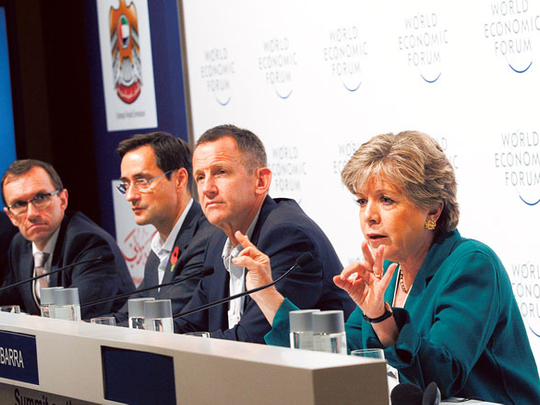
Dubai: The struggle for policy traction in a multipolar world will remain the biggest challenge for a think-tank launched at the summit on the Global Agenda, its members said on Monday.
“We are overwhelmed with information and it is the analysis that makes the difference and the ability to get that analysis to the right policymaker at the right time is a challenge. We all struggle with this issue and there is no easy solution and I think that is our major challenge going ahead,” said Robin Niblett, director of the Chatham House, United Kingdom, and a member of the Global Agenda Council on Europe.
The think-tank will have 25 members and has so far had two rounds of meetings in Dubai. It plans to meet on a periodic basis to discuss issues such as income inequality, jobless growth, the erosion of global leadership, rising geostrategic competition and geopolitical tensions, among others.
From the GCC, Abdul Aziz Sager of the Gulf Research Centre in Saudi Arabia is a part of the think-tank.
“We want to address how these issues are linked, for instance, [whether] persistent jobless growth and rising inequality is linked with rising nationalism and [whether] rising geostrategic [is] a cause or effect of a lack of global leadership,” said Espen Barth Eide, managing director, and member of the managing board of the World Economic Forum (WEF).
The demand for this facility is growing all over the world and has been created in countries where it didn’t existed before, Niblett said.
“The management of policy is not just in the hands of the government. Governments are not in charge the way they were before and think tanks have traditionally sat at the interception between governments and non-governmental sectors and provide a trusted space or mutual space for debates to happen in the longer-term,” Niblett added.
Erosion in leadership
Globally, governments rank seventh on the list of sectors eliciting the most trust and confidence, while non-governmental organisations along with business constitute the first two on the list.
“Political leaders all over the world have been overwhelmed with the magnitude of the problems that they are facing,” said Carl Dildt, the former prime minister of Sweden. “I don’t say that it wasn’t a complex world before but it is becoming increasingly complex and increasingly challenging.”
The world has faced an environmental challenge in the form of climate change, health challenges such as those in the form of Ebola, as well as geopolitical tensions such as the Daesh threat in the Middle East or Russian aggression in Ukraine. All this has led to falling levels of confidence in political leadership.
“We are in this period of mounting challenges or a multitude of mounting challenges,” Dildt said.
Business elicits the least amount of confidence from government leaders, the survey of more than 1,700 experts conducted by the World Economic Forum also revealed.












